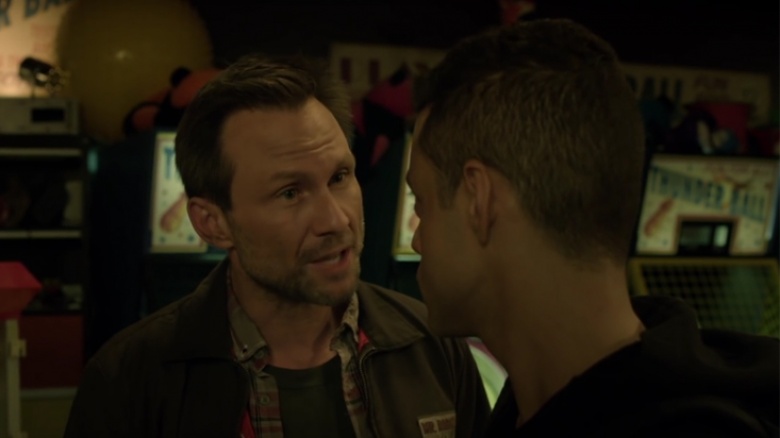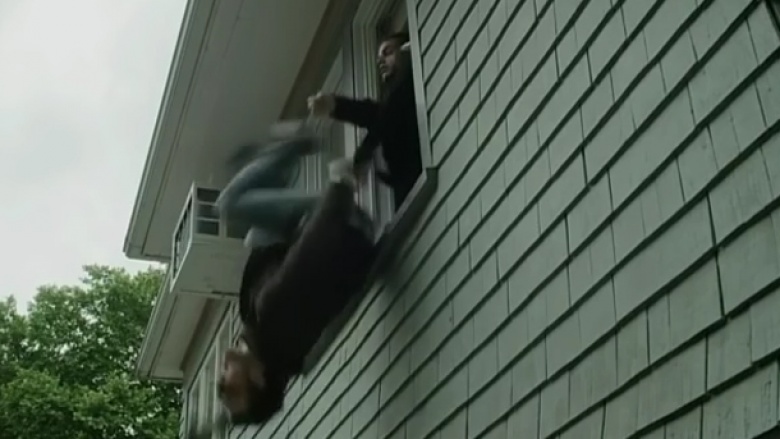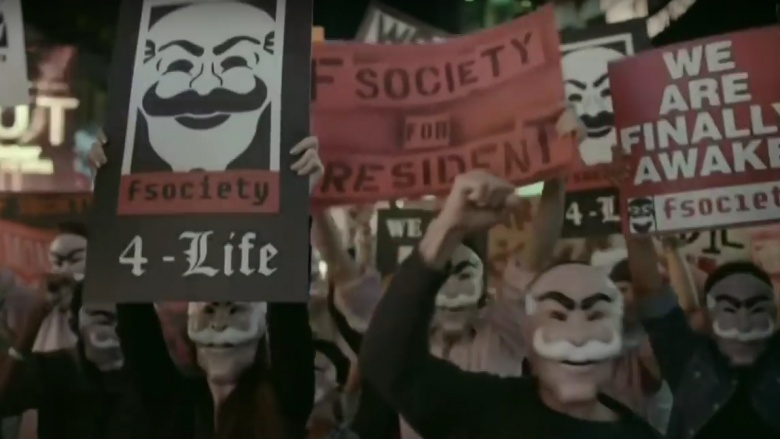All The Ways Mr. Robot Ripped Off Fight Club
Mr. Robot tells the story of Elliot Alderson (Rami Malek), a brilliant programmer and hacker who attempts to take down the giant, aptly named Evil Corp. Pushing Elliot to perform more and more dangerous attacks is the mysterious Mr. Robot (played by Christian Slater), who as the series progresses seems more and more likely to be a figment of Elliot's imagination. Is this starting to sound familiar? It should, because it's the first of many parallels Mr. Robot has to the 1999 cult classic Fight Club. Read on for more, but beware—there are spoilers ahead.
Elliot's "F" society rant
In the first episode of Mr. Robot, Elliot visits his psychiatrist's office, where he's being treated for a yet-to-be-disclosed severe mental illness. We'll find out much later in the season that he suffers from dissociative identity disorder, but in this memorable scene, he lays out what is essentially his character's manifesto. After his therapist asks "What is it about society that disappoints you so much?," Elliot daydreams his response, an epic rant condemning modern culture as a flimsy mask of consumerism and technological distraction that we all willingly use to avoid the reality that life is meaningless. He also coins the phrase "F— society," which is later adopted as the name of the hacker collective he leads on a quest to upend society in some very fundamental ways.
Elliot's rant is almost identical in theme to a speech Tyler Durden delivers in Fight Club, to a group of men before a night of fighting begins. He says, "Advertising has us chasing cars and clothes, working jobs we hate so we can buy s— we don't need. We're the middle children of history, man. No purpose or place." Tyler continues throughout grooms these men into his own collective, eventually culminating in Project Mayhem—a series of chaotic attacks on symbolic societal institutions.
Elliot is Mr. Robot
This is the biggest and most obvious similarity between Mr. Robot and Fight Club, but it goes a little deeper than just the fact that the two main characters each have an imaginary friend. For both Elliot's and Edward Norton's character (who is never named, but is widely speculated to be "Jack" from the diaries he reads), the imaginary friend represents their id: the unrestrained instinctual part of the psyche. By creating these alter egos, both Elliot and "Jack" can detach from dangerous and illegal activity. Tyler Durden, "Jack's" alter ego, is ultra cool and enigmatic, but ultimately manipulative in order to achieve his vision. Mr. Robot, Elliot's alter ego, is mysterious, brilliant, and also extremely manipulative. They both psychologically and physically coerce Elliot and "Jack" into taking massive risks only to disappear, leaving them alone to handle the consequences.
Elliot fights himself
One of the most memorable scenes in Fight Club depicts "Jack" beating the crap out of himself in his boss's office before extorting a sweet severance package out of him. In the finale of season one, Mr. Robot and Elliot have a physical confrontation in a coffee shop—a fight later shown to be Elliot choking himself while the other customers look on in horror. The two scenes are a little different because one character is fully aware of what he's doing while the other is in the throes of a full-on delusion, but the physical gag is the same.
Elliot gets rid of Mr. Robot by harming himself
In terms of physical confrontation between Elliot, "Jack," and their alter egos, both the film and the show share plenty of similarities. Tyler and "Jack" have their fight club revelation after trading drunken blows outside a bar, and there are countless other times when they actually touch each other. On Mr. Robot, there was the aforementioned coffee shop fight, as well as a time early in the season when Mr. Robot shoved Elliot off a railing above a steep drop. But on top of the fact that both sets of characters routinely touched each other, another striking similarity in theme is that both Elliot and "Jack" used physical violence to rid themselves of their delusion once they understood the depths of their own insanity. Elliot shoves himself out the window of his childhood bedroom, while "Jack" takes a more drastic approach and shoots himself in the mouth. Both actions effectively rid themselves of their hallucinations, even if in Elliot's case it was only temporary.
Eliminating everyone's debt
On Mr. Robot, Evil Corp. is a financial corporation so monolithic that when fsociety's hack takes them down, the entire world's financial markets are fundamentally disrupted after a massive number of people's debts are seemingly eliminated. Fight Club's Project Mayhem has the exact same goal—to eliminate global debt—only they achieve their end by more practical means, choosing to literally destroy the buildings in which the financial institutions are housed. There's even a parallel between "Jack" helplessly watching the buildings implode and Elliot marvelling at the chaotic celebration in Times Square, both wondering what they've done.
"Where Is My Mind"
Mr. Robot creator Sam Esmail told Entertainment Weekly he embraces the show's comparisons to Fight Club. "I'll say this right now. I rip off of every movie and TV show I've ever seen in my life. I'm a film nerd," he explained, admitting that his show's use of the Pixies Fight Club soundtrack number "Where Is My Mind" in a climactic moment between Elliot and Tyrell was "in part letting the audience know that we're very much aware that Fight Club was an inspiration, but at the same time, we make no apologies about it. We own it."
Inspiration is an interesting word to use there, and perhaps it would be more accurate if there weren't so many other elements than just that song "borrowed" from the 1999 film. Sure, there were no hackers in Fight Club, but Mr. Robot has a protagonist who suffers from the same mental illness, has the same disillusionment with society, who tries to free himself by harming himself, and who becomes an unwilling agent of chaos, executing a destructive plan with identical goals. And yes, taking inspiration from other great works is something anyone in a creative field has to deal with, but what Esmail did here was the equivalent of taking a slice of pizza, adding pepperoni, and claiming he invented a whole new food "inspired" by pizza. Mr. Robot, while admittedly a solid show, is just Fight Club with hackers.



